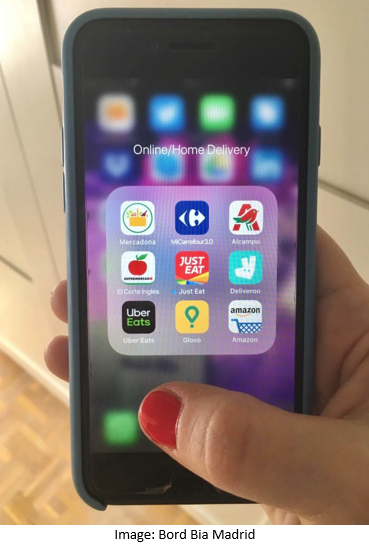Author: Roisin O’Sullivan, Market Specialist Spain, Bord Bia – The Irish Food Board
Most of you may be familiar with Bord Bia’s consumer trends and more specifically the Fuller lives trend where we want to use our time to be as productive and sociable as possible, flowing from one thing to the next – and want to be helped, not hindered by tech…
As most countries across the globe are in some form of lockdown, it’s safe to say our lives have never been fuller or busier or more chaotic than they are right now. Our homes have become our workplace, our gym, in some cases our kid’s classrooms, where we still try to socialize and connect with each other online and everything in between. Trying to adjust to this very busy and disruptive time in our lives leaves no surprise as to why technology, online apps and platforms have become more essential to assist us than ever before.
Consumer habits have shifted to adapt to weeks of lockdown in Spain and Online has had unprecedented demand. Food has taken the lead in e-commerce in this period of confinement, Specifically, one in three users has chosen to fill their fridge, pantry and freezer online, when traditionally this channel has had a hard time making a place in the digital world due to lack of confidence in its operations. According to Kantar’s research, Online mass consumption purchases reached their all-time high in the third week of confinement and e-commerce continued to gain market share going from 1% last year to close to 3% now and growing. Other studies undertaken by AECOC state that 20% of people who had never made online purchases before the pandemic have now started to do so, and 17% assure that they will maintain this trend once the confinement ends.
With these great changes and challenges in the market, we have also seen great collaborations with synergies and Omni-channel developments.
Foodservice and Retail merging and innovating together as they continue to face the challenge of overcoming supply and distribution difficulties to provide essential services for the Spanish consumers. Some examples of this are platforms such as Glovo, who allied with supermarket chains Carrefour and DIA and Organic chain Veritas. Carrefour has even extended the agreement with Glovo to include the Carrefour Express supermarkets located at Cepsa gas stations.
In the foodservice channel – Home delivery accounted for 16% of the sector in 2019 – and albeit establishments have had to close, many have tried to remain open continuing offering the home delivery option. Deliveroo has made every effort to respond to the new needs that have arisen as a consequence of this. They stated that they have a commitment to the local economy and in these uncertain times they wanted to make an effort to give their greatest support. For this reason, they signed agreements with more than 700 new restaurants, in addition to the more than 7,500 that they already have on the platform.
Both Uber Eats and Deliveroo have also joined the delivery service of supermarket purchases, which was predominately governed by Glovo. Given that there has been such demand, all of the online platforms are playing their part in supporting the industry.
We have seen other examples of food & drink companies adapting to online. Breweries have been greatly affected by the closure of the foodservice industry. Although supermarket sales are growing, it’s not enough to cushion the blow to the drop in beer consumption, so Spanish beer brand Mahou has started to sell and distribute beer at home – using the clever slogan ‘Stay home. Voldis brings the bar to your house’. Voldistribución, the company that distributes Mahou San Miguel, is distributing its beers to homes in Granada, Madrid and Valencia for the duration of the lockdown.
Estrella Galicia also launched an online/delivery service on its website with the aim of serving consumers at home. Even fishmongers have had to innovate. In Barcelona companies like La Platjeta, are selling seafood online and delivering it to their local communities and have had high demand for this new service over the past few weeks.
Post coronavirus consumers will be more aware of both their surroundings and their own well-being. They will be more digitally focused, less loyal and more price sensitive.
Home delivery of goods, online purchasing of products and the use of platforms for virtual leisure and telework will have become so embedded into consumer habits that we are sure to see some of it continue into the future. Something all Irish manufacturers will have to take on board and adapt to in order to compete both in the home market and on the global stage.
Sources:






